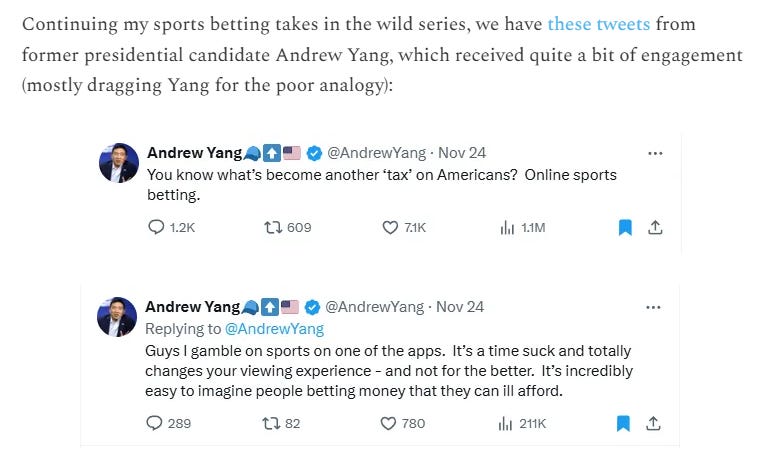The Great Pretenders
I listed the Top 5 yesterday, and as promised, here are 5 more states that have (a very slim) chance to legalize online casino gambling in 2025.
The Bulletin Board
NEWS: The best online casino candidates heading into 2025, #6-#10.
NEWS: Robinhood expresses a “keen” interest in US sports betting.
LOOSE ENDS: Sweepstakes sites face RICO Lawsuit; Accel finalizes purchase of Fairmount Park; Quote of the Week; Read of the Week
NEWS: Bovada bids adieu to Arizona.
AROUND the WATERCOOLER: Andrew Yang wants to blow up the online betting experiment.
STRAY THOUGHTS: Wild, Wild Life
SPONSOR’S MESSAGE - Sporttrade was borne out of the belief that the golden age of sports betting has yet to come. Combining proprietary technology, thoughtful design, and capital markets expertise, our platform endeavors to modernize sports betting for a more equitable, responsible, and accessible future.
Sporttrade is now live in their fifth state; Virginia
Five More iCasino Candidates in 2025
Continuing from yesterday’s entry, here are five more online casino candidates in 2015, with some rapid analysis.
Are you looking for more analysis? Reach out to Steve to sign up for The Forecast, a premium service from Straight to the Point Consulting, for quarterly reports and weekly updates on legislative efforts in online casino, poker, and sports betting.
New York
STTP FORECAST: Possible, but unlikely.
NY is the industry’s “little Engine That Can’t,” as effort after effort has fizzled out despite the positive comments from optimistic supporters. The major roadblocks are labor unions, the ongoing licensing of downstate casinos (which is likely to stall any online gambling discussions), and Gov. Hochul’s ambivalence toward the issue.
Wyoming
STTP FORECAST: Possible, but unlikely.
A new report from Spectrum Gaming concluded online casinos would be accretive to Wyoming’s tribal casinos (tribal members disagree). However, Spectrum also said that while not cannibalistic, online could steal land-based growth in other markets, which will be a significant concern for the state’s gaming tribes and racetracks.
Arizona
STTP FORECAST: Dark horse status.
Arizona crept into the discussion after a September iDEA Growth Webinar, where Matt Olin, CEO of Apache Gaming Enterprise, said he “wouldn’t be surprised if [iGaming] came very soon.” At the recent Arizona Indian Gaming Association Expo, tribal attorneys said while nothing is imminent, talks have begun.
Illinois
STTP FORECAST: Unlikely.
Expect another effort in 2025, but iGaming will have to wait until the VGT industry is on board. A bright spot is Accel’s purchase of the former Fairmount Park racecourse, which sets the company up for an online casino license.
Maine
STTP FORECAST: Unlikely.
After a successful sports betting rollout, Maine quickly shifted to exploring iGaming. Strife within the MGCU and threading the tribal-commercial needle are significant hurdles.
Also, watch Louisiana, Kentucky, Massachusetts, North Carolina, and Ohio.
Robinhood Sets its Sights on Sports Betting
To no one’s surprise, and as previously reported in STTP, Robinhood isn’t satisfied with its recent foray into election betting and is now exploring its options in the larger sports betting space.
“We’re keenly looking into that space. Nothing to announce just yet, but it’s so important to our customers and in culture that we’re excited about it,” Robinhood CEO Vlad Tenev said at the company’s inaugural investor day event.
The big question is, what would a Robinhood sportsbook look like?
According to Sporttrade (a newsletter sponsor) CEO Alex Kane, it would stay true to its brokerage firm and election event contracts DNA.
That sentiment was echoed by the team at JMP Securities, who wrote in a note that a traditional sportsbook doesn’t align with Robinhood’s stated goals of increased profitability and setting up a betting exchange is the “more sensible path”:
“Building out a sports betting product requires a checklist of costly and time-consuming initiatives. The sector has proven it can take years (if not decades) to properly build an end-to-end app with product and technology, including the need for executives, and potentially holders, of the stock to obtain gaming licenses.”
The JMP team pointed to the $14 billion US sports betting opportunity. Still, it cautioned, “Even investments from the established mid-scale online companies have ranged from hundreds of millions to billions of dollars, only to garner mid-single-digit market share.”
JMP did lay out the alternative path, which would likely require an acquisition, with Rush Street Interactive and Fanatics listed as possible targets.
SPONSOR’S MESSAGE - SUBSCRIBE NOW to Zero Latency, the new podcast from Eilers & Krejcik Gaming that provides unparalleled insight into the U.S. online gambling industry through interviews with industry insiders and analysis from EKG experts.
Loose Ends: Sweeps RICO Lawsuit; Accel Purchases Fairmount; Quote of the Week; Read of the Week
Another sweepstakes lawsuit, but this time there’s a twist: The sweepstakes industry is facing a slew of class action lawsuits, but the latest one filed in New Jersey has a unique twist. As SBC Americas reports, “A new class action lawsuit in New Jersey is not only going after sweepstakes casino operators but Google and Apple as well.” Along with listing multiple sweepstakes sites, which the suit calls illegal gambling, it also names Apple, Apple Pay, Google, and Google Pay as defendants for enabling and supporting sweepstakes operators under the Racketeer Influenced and Corrupt Organizations (RICO) Act.
Accel Entertainment closes Fairmount Park acquisition: VGT operator Accel has expanded its portfolio following the purchase of Fairmount Park, which adds horse racing, an Organization Gaming License to offer casino gaming, and a partnership with FanDuel to participate in sports wagering. If Illinois ever legalizes online casino gambling, this acquisition could be a turning point. As I wrote in September, “According to several industry sources, “online gambling is a no-go without the VGT industry’s approval.” Accel’s purchase of a land-based casino (which places it in line for an online license should Illinois go down that road) is far from a golden ticket, but it does provide a glimmer of hope.”
Quote of the Week: "So I think you're right. I think a lot of effort, especially in the House, was put into this bill — tough vote, very hard vote. I'm not one that's particularly for gambling, but I had people on both sides of the issue call me and say, 'Hey, let us vote.' And that's what we voted for, is to let the people vote, whether it was up or down. Now, I think the people would really vote for just a plain lottery bill, but I just don't see that having a chance in either house."~ Alabama State Rep. Mark Shirey on Alabama gambling expansion.
Read of the Week: Live Dealer Seems Like A Smart Way To Introduce States To iCasino, by Jeff Edelstein at Casino Reports.
Arizona Is the Latest State To Give Bovada the Boot
Bovada has added Arizona to its list of restricted states, now numbering 16, plus the District of Columbia.
The Arizona Department of Gaming sent Bovada a cease-and-desist letter on November 8, 2024, per a press release from the ADG:
“The operation of Bovada in Arizona is alleged to be a felony criminal enterprise and Bovada has been directed to desist from any future illegal gambling operations or activities of any type in Arizona. Due to the unregulated and illegal online gaming offerings on Bovada, Harp Media B.V. is claimed to be in violation of Arizona gaming laws, including:
Promotion of Gambling (Felony) -- Ariz. Rev. Stat. Ann. § 13-3303.
Illegal Control of an Enterprise (Felony) -- Ariz. Rev. Stat. Ann. § 13-2312.
Money Laundering (Felony) -- Ariz. Rev. Stat. Ann. § 13-2317.
As Sports Betting Dime’s Robert Linnehan noted, “Bovada followed its typical pattern when faced with a cease-and-desist notice. It never acknowledges receipt of the notice and did not inform the Arizona Department of Gaming it was placing the state on its restricted list.”
As previously reported, Tennessee not only issued a cease-and-desist letter, it also fined the company — no word on whether it has ever collected. If I’m a Tennessee regulator, I wouldn’t hold my breath.
Around the Watercooler
Social media conversations, rumors, and gossip.
I previously noted that former presidential candidate Andrew Yang has joined the growing chorus of mainstream media and political leaders expressing their concerns about mobile betting.
Yang has now taken it a step further, writing an op-ed in Newsweek, where he said:
“I do something regularly that I wish I didn't. I bet on sports online.
“[…}
“I'm one of their customers. I watch a lot of sports and started betting on various games and events a couple years ago. I was enticed in part by a promotion that would give me $250 if I made a couple of bets. Who would turn down free money? Not me.
“[…]
“So what are the problems?
“The data are clear and compelling—and not good. As author Charles Fain Lehman put it, "The rise of sports gambling has caused a wave of financial and familial misery, one that falls disproportionately on the most economically precarious households."
Yang is aware the toothpaste is out of the tube, but concluded with the following appeal to states considering legalization:
“I would love to see the regulation on this issue rethought. The main imperative right now is for the states that have not made sports betting legal—Alabama, Alaska, California, Georgia, Hawaii, Idaho, Minnesota, Missouri, Texas, and Utah—to keep it from reaching people's phones. I'm sure the companies are in your statehouses right now making their case. "It's easy tax revenue and everyone else is doing it! It's fun!" But the facts are clear. Online sports betting is the equivalent of a new tax on Americans that preys upon vulnerable, low-income men in particular. It increases financial stresses and emotional problems. It's not what your citizens need.”
Stray Thoughts
Things are getting a little crazy as we head into the holiday season, with 2025 legislative sessions to follow.
And for something even crazier, might I suggest the Netflix documentary on the 1990 Isabella Stewart Gardner art museum robbery, This Is A Robbery.
And for added measure, one of the great cameo videos of all time:







